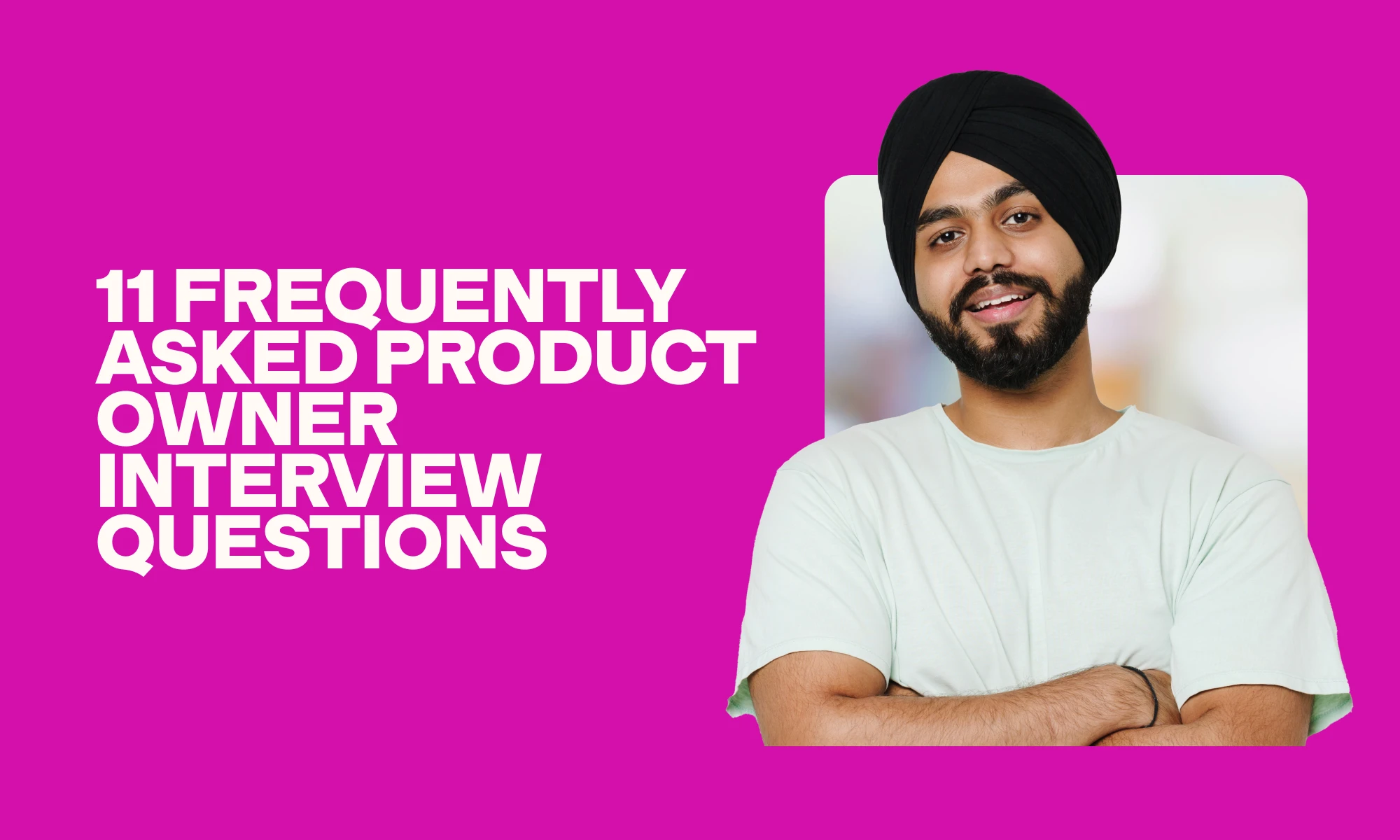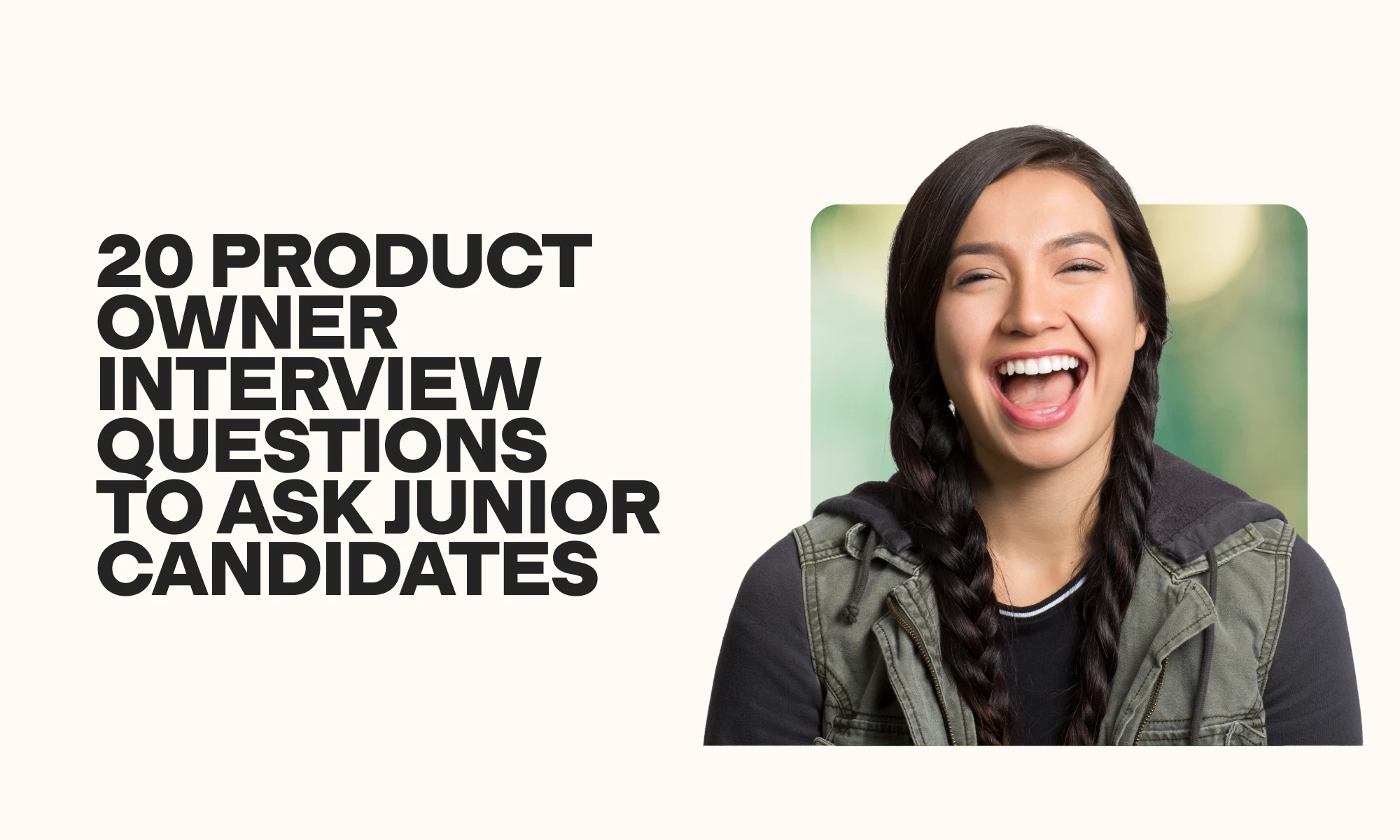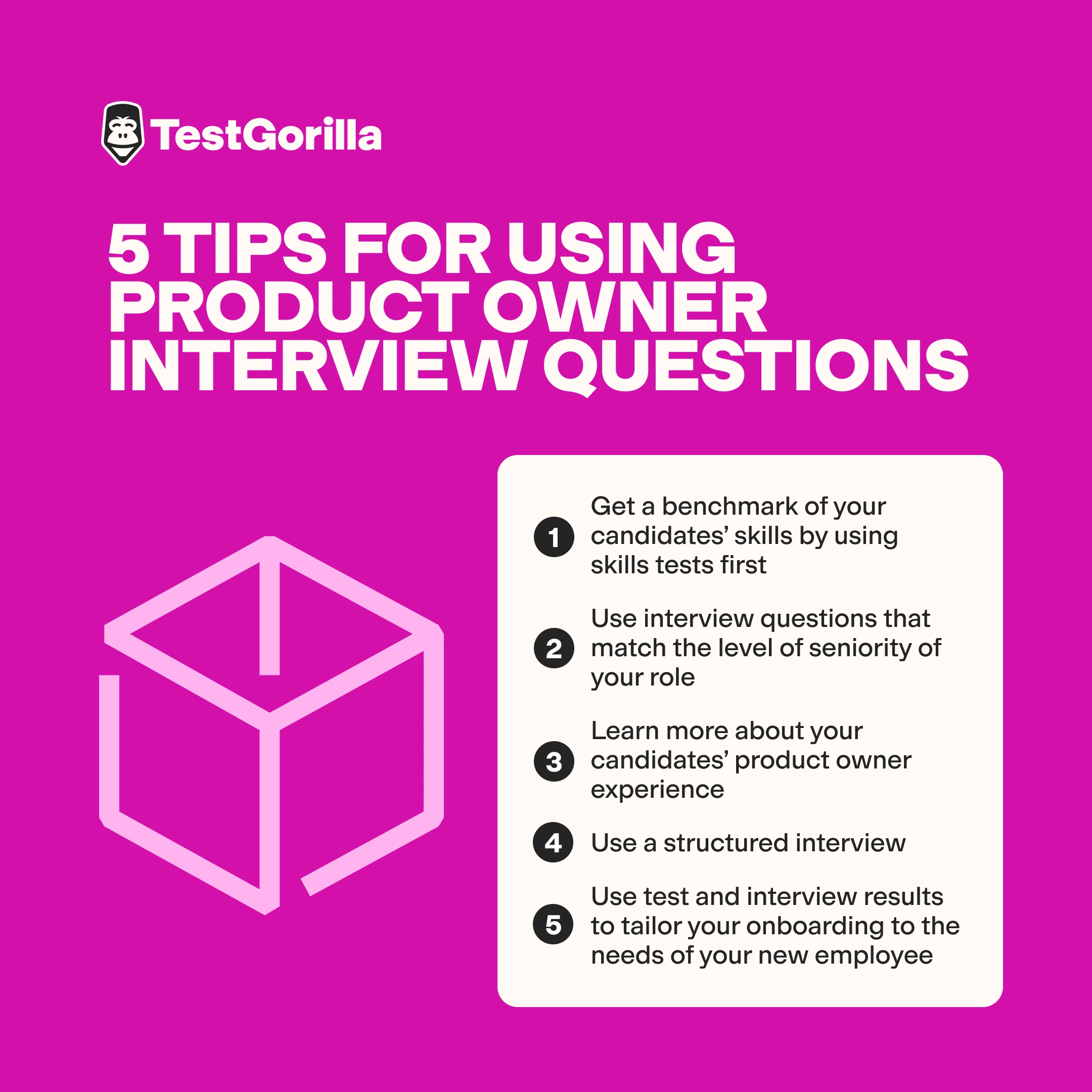Skills testing makes candidate assessment for product owners much easier
With the right interview questions and skills testing, finding the best product owners will be a breeze!
Looking for a suitable product owner to join your team?
It’s a vital role that plays an important part in product development – and making the wrong hire could turn out to be a very costly mistake.
How can you tell if your applicants have the right product owner skills to confidently assist your team?
There are two main steps you need to take to assess applicants’ abilities: Skill testing and interviews.
It can be challenging to decide on the best questions to ask applicants during the interview phase.
But we’ve got the solution you need – in this article, you’ll find a comprehensive selection of 51 product owner interview questions to ask applicants.
Pick your questions from the list below to hire effortlessly.
Table of contents
- 11 frequently asked product owner interview questions
- 5 frequently asked product owner interview questions and answers
- 20 product owner interview questions to ask junior candidates
- 5 product owner-interview questions and answers to assess junior candidates
- 20 product owner interview questions to ask senior candidates
- 5 product owner interview questions and answers to assess senior candidates
- 5 tips for using product owner interview questions
- Why use skill testing to hire product owners for your team?
- Hire the best candidate for your team using a combination of tools and tactics
11 frequently asked product owner interview questions
Ask your interviewees the eleven frequently asked product owner interview questions to evaluate their general knowledge.
Explain the difference between Agile and Scrum.
In which situation would you use the Agile model?
Explain what the Scrum Framework is.
Explain what a Sprint is.
Explain what a product owner does.
What skills do product owners need to be successful?
What soft skills do product owners need to be successful?
Which skills have helped you perform well as a product owner?
Which skills do you want to develop as a product owner?
Explain what a product roadmap is.
Outline the main roles in a Scrum team.
5 frequently asked product owner interview questions and answers
Below, you’ll see the answers to five of the frequently asked product owner interview questions from the previous section. Use them to assess your applicants’ responses.
1. Explain what a product owner does.
Applicants should know that the product owner is responsible for motivating the team to accomplish the vision and goal of a project.
They work closely with the development team to increase the product’s value for stakeholders by taking on a “customer proxy” role and serving as an intermediary between the client and the team. For this, they also need to be able to find out the answers to any queries the team may have.
2. What skills do product owners need to be successful?
Do your candidates know that coding and product design are vital technical skills for product owners? Can they explain that knowledge of Scrum and Agile development methodologies are also key, as is product development architecture knowledge?
3. What soft skills do product owners need to be successful?
Conflict resolution, communication, time management, leadership, and problem-solving are among the top soft skills that all product owners need. Does your candidate have the required skills for your open role? Are they making a constant effort to develop their soft skills?
4. Which skills have helped you perform well as a product owner?
Candidates may mention various skills when responding to this question. They may explain that problem-solving skills have helped them resolve a team’s queries or that their knowledge of Agile methodology helped them communicate with their team efficiently. Look for applicants whose skills match your requirements.
5. Which skills do you want to develop as a product owner?
Candidates should always seek to gain new skills or refine the skills they have.
For instance, they may need to improve their communication skills to be able to assist teams better. Or they may lack data-analysis skills that would help them make the right decisions. Look for applicants who can explain in detail how they plan to improve their skills and are motivated to hone them consistently.
The best insights on HR and recruitment, delivered to your inbox.
Biweekly updates. No spam. Unsubscribe any time.
20 product owner interview questions to ask junior candidates
Ask your junior-level interviewees some of these 20 product owner interview questions to see if their knowledge aligns with the requirements of your role.
Explain what velocity means in Agile.
How do Scrum teams measure velocity?
Explain why velocity is important.
Which criteria should you consider when setting a vision?
What is a product backlog?
Explain what product increment is.
Explain what a user story is in Scrum.
Explain how product managers are different from product owners.
Who is responsible for setting Sprint goals?
Which techniques would you use to prioritize tasks in a backlog?
Explain what the 100 Dollar Test is.
Explain what the Cost of Delay method is.
Explain what Stack Ranking is.
Explain what strategy means for product owners.
What is a stand-up meeting?
What are collaborator cards?
What is a timeboxed task board?
What is a code review?
Name some features of a Burndown chart.
Explain why Burndown charts are important for product owners and teams.
5 product owner-interview questions and answers to assess junior candidates
Check the answers to five of the most important product owner interview questions taken from the list above. Use them to assess your junior candidates’ responses.
1. What is a product backlog?
Candidates should be able to explain that a product backlog is a document that outlines each requirement for the final product, which also serves as a task list. In other words, the backlog features all tasks required to finish a product and achieve its goal.
2. Who is responsible for setting Sprint goals?
Candidates applying for a product owner role should know that the product owner is responsible for setting Sprint goals. Your applicants may explain that Sprint goals are vital for the smooth functioning of the development team.
3. Explain how product managers are different from product owners.
Can your applicants explain that product managers aim to establish the product’s vision and align it with the market and the company’s objectives while product owners define the specific tasks that teams must accomplish?
Do they know that product managers decide on expected business outcomes while product owners establish iteration goals?
Applicants should also be able to explain that product owners also help define the product’s vision, but on a more tactical level.
4. Which criteria should you consider when setting a vision?
Applicants should know that a vision is the organization’s goal for the specific product. When defining a vision, the product owner should be aware that it needs to be:
Precise
Appealing and engaging
Simple and easily understood
5. Explain what velocity means in Agile.
Do your interviewees know that velocity in Agile refers to a metric development teams use to measure workload completion in timeboxed periods? Can they explain that velocity is one way to estimate how quickly a team can complete tasks and, ultimately, a project?
20 product owner interview questions to ask senior candidates
Ask your senior interviewees some of these 20 product owner interview questions to evaluate their knowledge.
Explain what a product increment is.
What is a vision?
Explain what a release burndown chart is.
Explain which components of Agile are most important.
Explain what the Kanban framework is.
Explain what lean software development is.
Explain what extreme programming is.
Explain what feature-driven development is.
Explain what test-driven development is.
Explain what the DEEP criteria are.
How would you filter user stories before deciding whether to add an idea to a backlog?
Name three situations where you shouldn’t use Scrum.
Why is timeboxing crucial for teams?
How long should a Sprint last?
Explain what the waterfall method is.
When would you use the Waterfall method instead of Scrum?
What are the biggest challenges you may face as a product owner?
How would you optimize your team’s output as a product owner?
Which action would you take if your development team constantly fails to meet Sprint commitments?
Which project management tools would you use as a product owner and why?
5 product owner interview questions and answers to assess senior candidates
See the answers to the five most important advanced product owner interview questions below to assess your senior candidates’ responses.
1. How long should a Sprint last?
Experienced candidates should know that a Sprint can last anywhere from one to four weeks.
2. Name three situations where you shouldn’t use Scrum.
Applicants should know that there are some situations where Scrum isn’t recommended, such as the following:
The project’s requirements don’t change very much
The project owner is working with large groups
The team is not permitted to organize themselves
3. Which action would you take if your development team constantly fails to meet Sprint commitments?
Your applicants should know that understanding why a development team fails to meet its Sprint commitments is important.
Development teams may have been given an incorrect estimation, or there may be a lack of efficient team collaboration, or they might fail to understand the user story. The product owner should determine the cause and then work to solve the problem.
4. Which project management tools would you use as a product owner and why?
There are a few project management tools your product owner applicants may mention when responding to this question. From Rally Software to Version One to XPlanner, applicants may have used a number of tools. Consider applicants with specific knowledge of your organization’s project management tools or those who are motivated to learn how to use them.
5. Why is timeboxing crucial for teams?
Your applicants should be aware that timeboxing is crucial for teams for two main reasons. Timeboxing:
Enhances the focus level of the development team
Helps project owners gather metrics related to performance
5 tips for using product owner interview questions
Now that you have an extensive list of 51 product owner interview questions to help you interview candidates and assess their skills see our five tips below to learn how to use the questions efficiently during your hiring process.
1. Get a benchmark of your candidates’ skills by using skills tests first
Start by sending your candidates an invitation to complete a skill assessment that features a Product Owner skills test like TestGorilla’s. Send the invitations before the interview to help you understand if your candidates’ skills align with the demands of your open role and to identify the most skilled applicants. These are the ones you should invite to an interview.
2. Use interview questions that match the level of seniority of your role
Always use interview questions adapted to the seniority level of the open role.
You might be hoping to hire internally or promote a candidate who has junior-level product owner experience. In that case, choose questions for junior candidates.
Alternatively, you may want to hire a candidate for a senior product owner role. For this role, you should consider using advanced product owner interview questions.
3. Learn more about your candidates’ product owner experience
Before getting to the crux of the interview, learn more about your candidates’ product owner experience to find out whether their experience is a match for your open role. If not, use follow-up questions later on in the interview to determine whether they’re motivated to learn and adapt to your role.
4. Use a structured interview
Structured interviews make decision-making easier for you – and the interview process fairer for your candidates. To perform a structured interview, always stick to the same questions in the same order.
The responses you get from candidates during unstructured interviews can be difficult to evaluate and leave room for unconscious bias. You should avoid this type of interview; instead, if you need extra information from your applicants, ask them follow-up questions.
For instance, if you need to assess your applicant’s capacity to use timeboxing efficiently, ask them, “Can you describe your previous experience with timeboxing?” as a follow-up to “Why do you think timeboxing is important?”
5. Use test and interview results to tailor your onboarding to the needs of your new employee
By combining your applicants’ interview responses and skills assessment results, you can get an in-depth understanding of their skills and of the areas in which they could improve.
Tailor your onboarding experience to their specific needs for the best results. Use our onboarding checklist to ensure you don’t forget anything.
Roll out tests, track results, and make hiring decisions from an intuitive, unified platform.
Why use skill testing to hire product owners for your team?
Skill testing is an objective and reliable way to assess applicants’ skills quickly. Using skill testing as part of your hiring process means you can reduce your hiring time and evaluate your product owner applicants’ skills efficiently.
One bonus of using skill testing to hire product owners is that you don’t have to rely on resume screening.
Yes, that’s right: You can eliminate this time-consuming process altogether and assess your applicants’ technical and soft skills more thoroughly with a skills assessment.
Hire the best candidate for your team using a combination of tools and tactics
You’ve now got a complete list of product owner interview questions, along with tips and advice on how to hire an expert product owner for your team.
Remember: Skills testing makes candidate assessment much easier and more objective and reliable.
Check out TestGorilla’s test library for role-specific tests, soft skill tests, and personality tests. Select up to five for your skills assessment and send it to prospective employees to evaluate their skills without bias. And remember to include our Product Owner test in the assessment to identify the most experienced product owners among your candidates.
With the right interview questions and skills tests, hiring the best product owner will be a breeze! Get started for free today.
You've scrolled this far
Why not try TestGorilla for free, and see what happens when you put skills first.




















